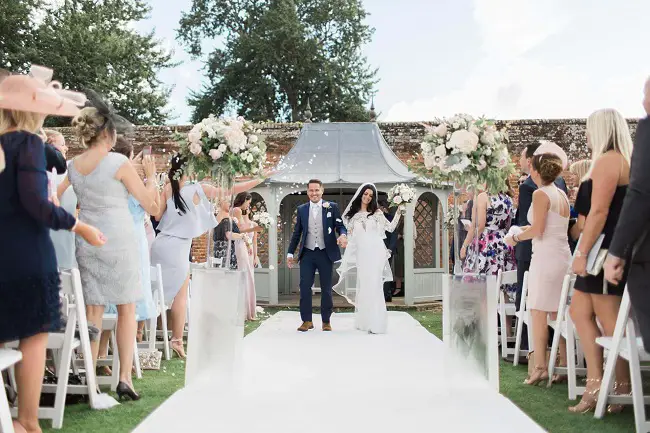
Joe: Hey, Will, how’s it goin’?
Will: Hey, what’s goin’ on? Not a lot.
Joe: Man, I don’t, you know what, now that I see you right here, I don’t think I’ve seen you in probably like six weeks.
Will: Yeah.
Joe: ’?
Will: I don’t know, though.
Joe: [laugh] Yeah.
Will: How, how have you been?
Joe: Yeah, I’m doin’ really well. I, I don’t th-…you know what, I haven’t seen you since your wedding.
Will: I know. I know, I want to, uh, I want to tell you all about it. I can’t believe .
Joe: Yeah, you know what, I told you the only reason I didn’t make it is because my uncle was getting married back east. So, y’know, I was gone the entire week. But I was about it.
Will: Well you missed a good one.
Joe: Yeah, yeah, I know. I mean I was bummed that I couldn’t be there with all our friends. And, y’know, I’d never had a chance to meet Isabelle’s family. So, y’know, I’m really bummed that I missed that, too.
Will: Yeah, yeah, it was really nice having everybody out here from Spain.
Joe: Yeah.
Will: And, we had a good time.
Joe: How long had you, how long were you and Isabelle together before you guysgot married?
Will: Two years.
Joe: Wow, oh my god, .
Will: Yeah.
Joe: I remember that, y’know, when she first, uh, answered the ad you had for a roommate, so…
Will: [laugh]
Joe: …you guys broke , y’know, as far as roommates go, which is don’t sleep with your roommates when they move in.
Will: That’s right.
Joe: [laugh] But .
Will: . It was worth it this time.
Joe: Yeah, it’s all worked out. So I’m glad to see that, y’know.
Will: Absolutely.
Joe: Yeah. So, uh, y’know, you’ll have to give me some details on, y’know, I, I haven’t seen any of the pictures or anything, I don’t, maybe you didn’t get them back yet from the photographer.
Will: Well I can’t wait to, uh, show you the pictures, of course, but, uh, yeah, do you have a second? I’ll tell you about the wedding.
Joe: Yeah, yeah, totally. I wanna hear about it.
Will: Alright, well, we had kind of a, uh, wedding. We, um, got married at, uh, which was easy. And then we had our real ceremony at Stern Grove. You know where that is?
Joe: Oh yeah, yeah, yeah, right on 19th.
Will: Here in San Francisco.
Joe: Yeah.
Will: Underneath the redwood trees.
Joe: Oh, it must have been beautiful.
Will: It was very nice.
Joe:
Will: Actually we, uh, had a really beautiful day which is very unusual for summertime in, uh, San Francisco.
Joe: Yeah.
Will: As you well know.
Joe: Totally.
Will: We were planning on fog but we had really nice weather.
Joe: Oh that’s great. So everyone okay? Because I know that, uh, her family had a long way to come.
Will: Yeah. They, uh, they all made it. Her mom and dad, uh, their friend, uh, her brother and sister, of course, and, uh, her best friend from Spain came to represent all her, all her friends… We’re gonna go there, uh, soon and we’re gonna see her, uh, family and friends, y’know, th-, who couldn’t make it. But it was nice to have a group of her family and friends here in San Francisco for the wedding.
Joe: Oh that’s great. How, what, where is she from in Spain?
Will: Um, she’s from Bilbao.
Joe: Oh yeah, y’know, she told me that before but I can’t say that, y’know, I could recall the actual town ‘cause I’d never heard of it before.
Will: Yeah, it’s actually a very large city. Uh, it’s an industrial city. And it’s, uh, got uh, a new museum so it’s become more famous. But, uh, it’s been there a long time. And it’s a big city. But it’s not one of the most, um, uh, known cities in Spain perhaps…
Joe: Yeah.
Will: …like Madrid and Barcelona.
Joe: Yeah.
Will: So, uh, yeah. But they were all there and, uh, her brother, uh, read a Spanish love poem, uh. And, uh, that was really nice. And, uh, parts of our wedding were in Spanish, uh, for the people, um, you know our friends here who, uh, um, speak Spanish and also, uh, y’know, for her friends and family from Spain, yeah.
Joe: Sure, yeah that’s great. I know that you’ve been trying to learn a lot of Spanish lately.
Will: Yes I have, yes I have…well, y’know, I learned a lot of Spanish when I was in Chili but I’m learning a lot more with her now.
Joe: Oh that’s great. Yeah, because the only way you’re gonna really, uh, y’know, get more fluent in it is to use it every day.
Will: Absolutely. Yeah.
Joe: So, uh, I bet her father was happy to see that you .
Will: [laugh] I guess, I guess so, yeah.
Joe: I would imagine that, uh, maybe her, was her family pretty traditional and ? Or…
Will: Uh, no actually they’re more, um, uh, progressive in a way than, uh, Americans are. Americans actually, it seems, uh, are more and everything. We had a, uh, um, we had a very, uh, European wedding. They’re not as, uh, religious as people think. Americans are pretty religious.
Joe: That’s true.
Will: Yes. So, uh, they, uh, they loved everything we did and, uh, it was a really
good time. Yeah.
Joe: That’s great.
Will: Yeah, so, uh, .
Joe: Okay, well, uh, Will let’s for drinks sometime soon, it’s been too long.
Will: Sounds good.
Joe: Alright, I’ll talk to you soon.
Will: Alright, .
Joe: Bye.




